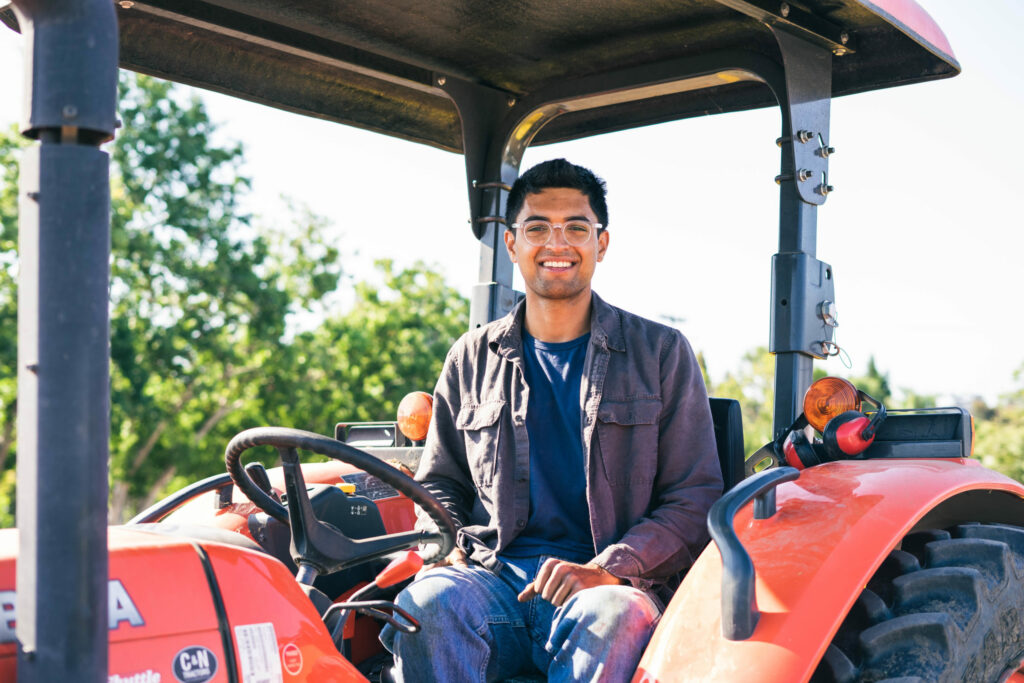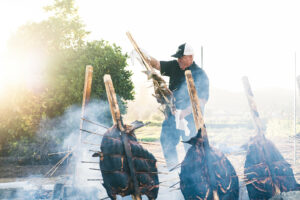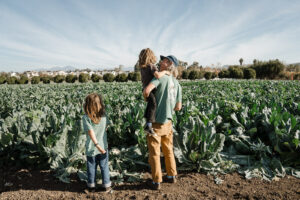When I was young, my first job was laboring on an iconic organic farm in Santa Cruz – Molina Creek. A summer spent picking tomatoes and sugar snap peas might have sent other students running for a corner office-style career, but for me, it revealed the passion that would guide the rest of my life. When fall came around, I was an enthusiastic new student in the agroecology course at UC Santa Cruz, where I trained under Steve Gliessman, a pioneering academic whose book Agroecology: The Ecology of Sustainable Food Systems established the structure for a human-centered ecological agriculture system for the last 40 years.

My passion was primed by those early experiences, and I gained a lot of knowledge and training through my formal education. Just as important, however, were the people I lived with, gardened with, and learned with on the campus farm. Through relationship with these people, I learned why this work was important—important enough to spend my life on.
The two halves of my education—formal/academic and informal/relationship-based—came together during the year I spent at Camp Joy, a four-acre biodynamic homestead run by Jim Nelson. Jim himself had been mentored by Alan Chadwick, a visionary British gardener who brought organic farming to the West Coast in the 1960s. Jim was one of those hippie kids who, as the saying goes, “tuned in and dropped out,” only Jim’s “tune in” came in the form of organic gardening. Upon dropping out of school, he immediately set up his own biodynamic farm in the sunny, redwood-ringed San Lorenzo Valley.
Camp Joy was a pristine example of the ecologically driven, community-run model that I had studied in college. Jim’s model demonstrated the most impressive range of diversity I’d ever encountered, integrating vegetables, fruit, flowers, and animals in a closed-loop system. He focused his efforts on growing things outside the bounds of convention—rather than limiting his production to familiar standards for the sake of market familiarity, Jim sought out crops with a story behind them: “Padron peppers? They’re our favorite roasting peppers. These came from my friend who smuggled the seeds from northern Spain.” This was 20 years before you began seeing these specialty menus of the premium restaurants of the bay area.
Camp Joy also had a strong “cottage industry” element to its culture. The farm was a hive of industry, with students constantly collecting and sharing information. Nothing went to waste; if we couldn’t sell it at the market, it was roasted, dried, preserved, or fermented into a new value-added product. The pantry was massive, packed with everything from windfall apple butter to roasted chiles to homemade vinegar. The kitchen ceiling was filled with flowers hung to dry. Every year, our production would go into overdrive as we prepared for a big weekend of welcoming the public to celebrate the harvest with us.

All these elements have gone into our farming model at The Ecology Center. While the scale of our farm today is very different from Camp Joy, the foundational principles are the same: integrated diversity, value-added production, and an emphasis on the importance of mentorship.
This last principle is particularly important in our Farm Apprenticeship program, which began this year when we took on eight young people with a passion for changing the food system for 8 months of mentorship. With this group, and future apprentices to come, we aren’t trying to simply educate and train new farmers—our goal is to create a culture around the philosophy and practices that define a regenerative lifestyle. As leaders in this movement, it’s our responsibility to model this lifestyle by giving more than we take. In training our apprentices, that ethic takes the form of mentorship.
Mentorship is different from education or training in that it’s relationship-based. By leading our apprentices through relationship, we demonstrate the power of collaborating for change.

Mentorship is how we dismantle the concept of “impossible.”
As a young person with big dreams, you need more than people saying “you can do it!” It’s essential to see people accomplishing what others say is impossible. When it comes to regenerative agriculture, our goal is to offer a daily demonstration of what others say can’t be done: building an ecological food future that provides for the health of people and planet. We then connect the dots between the present and the future by building the framework for transformation, developing skills through time-tested technique and impactful experience, and introducing our apprentices to experts who have adapted these ancient practices for our modern era. Mentorship at this level is crucial for inspiring the next generation to make greater strides than we dare to imagine today.
Mentorship turns people from participants to change makers.
Change is inevitable; it’s up to us to make change happen with intention. Guided by the belief that food is a primary driver for culture, we’ve chosen agriculture as our field for changemaking. But while healthy, nourishing food is something we can all get behind, it requires relationship to transform a nice idea into a nonnegotiable value. Mentorship is the secret ingredient behind that transformation. By educating and nurturing through relationship, we foster the connection between the farm apprentice and their community. Mentorship changes the question “Can I be successful at this?” into “If I don’t do this for my community, who will?”

Mentorship is how we drive replication.
The individual impact of building relationship can’t be overstated. It’s been a joy and an honor to nurture the passion and creativity of our apprentices on an individual level. But mentorship goes beyond enriching their individual experience. It’s about building a connected culture.
In mainstream culture today, mentorship isn’t readily accessible for most young people. With the exception of a few specific niches in academia or the professional sphere, it can be difficult to find guidance toward creating a meaningful, impactful life. As an organization, this is something we’ve placed as a top priority. We’ve designed mentorship opportunities throughout our organizational offerings, from the intergenerational mentorship that comes from learning from our community elders (Nourishing Neighbors) to the intentional focused mentorship that we receive from experts in their field (Culinary Center) to the mentorship that we receive from cultural and spiritual leaders at our community gatherings.
In our Farm Apprenticeship program, the mentorship extends beyond the field. We want to follow our apprentices’ journey and support them. Instead of training them and saying “Good luck!”, we want to incubate them, hire them when possible, equip them to pursue their journey, and most of all, keep building a culture that supports their endeavors going forward. We want The Ecology Center to be a place that our apprentices can always go home to.

Invest In a Connected Culture
The relationships that formed my early education are what really set me on course for the work that has defined my life. To this day, mentorship remains essential to how I live, grow, and evolve. I’m fortunate to have a dozen or so mentors in my life today, like my wife Kristin Morrison, who is my creative partner and an incredible guide, or The Ecology Center board chair Joe Baird, a wise business leader with a huge heart who nurtures and advises me in the work of running this organization. The list goes on.
These are people I lean on consistently for support in the areas where I want to grow and serve my community better. Rather than operate in a silo, like so many organization founders end up doing, I’ve found it essential to have a group of people whom I can call on. Thanks to their support, I’m able to better serve as a mentor, a collaborator, and a change maker.
Not everyone wants to be a farmer, but everyone wants to learn how to create a meaningful, impactful life. Mentorship is how we build a connected culture with the capacities needed for a healthy present and an abundant future.
Join us in supporting the next generation of leaders in regenerative agriculture.








